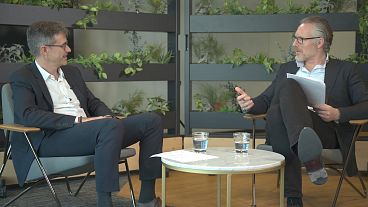When it comes to European SMEs, what challenges and benefits can digital tools bring?
Taking the risk to go digital is the hardest choice for many small and medium enterprises, but company bosses need to change their mindset to get ahead, a Euronews debate heard.
Help is at hand from specialised companies and government programmes across the European Union, experts from Huawei Technologies and representatives from European SMEs said.
Chris Burns, the host of the debate, said a recent European Union report found more than two-thirds of SMEs have a basic level of ‘digital intensity’, while the rest have yet to take advantage of this basic tool.
Euronews gathered together an expert panel at Huawei Connect Europe in Paris - you can watch the debate back in the video player at the top of this article.
Who was on the panel?
The panel included Jesus Contreras, the chief financial and operating officer of EIT Digital, which drives innovation for large corporations, start-ups, and talent.
Also joining the debate was Horst Heitz, chair of the SME Connect Steering Committee, a European business group.
Another guest was Afke Schaart, Senior Vice President of Government Affairs for Huawei, who has also worked as a director for Microsoft and was a Dutch MP.
Finally, the panel was completed by Amandine Laveau-Zimmerle, president of the DIGITAL SME France, and founder and CEO of Steel PC, an IT consulting firm which works in France and Luxembourg.
The guests discussed the current state of digital adoption among SMEs in Europe and the challenges this poses such as financial and employment uncertainty.
“SMEs have a whole bunch of problems. The CEOs feel they need to digitalise, but they are not convinced about the time and the money and the profit they will get,” Contreras said.
Schaart said many companies need to attain the necessary skills to go digital.
What’s holding SMEs back?
Cyber-security has proved a great concern for many SMEs – and the panellists too.
Heitz said his own email had been hacked in Bavaria.
“Many companies say they are worried about cyber security,” he added.
Costs for raw materials and energy are perennial problems but digitalisation can make this easier, the debate heard.
Schaart said it was important for SMEs to find a business network and share solutions to these difficulties.
“With technology, we can simplify the ways we do business,” she told the debate.
Digitalisation should be seen as an investment, not another cost, panellists said.
Laveau-Zimmerle said it was necessary to make the bosses of SMEs see that digitalisation was not a cost but an investment.
“To change the mindset, you have to explain to customers what they need to do for e-commerce,” she said.
What are the solutions to help SMEs?
Schaart said Huawei has been active in Europe for 23 years and has programmes in place to help start-ups.
She gave one example of a programme run in partnership with the Greek government, which involves a start-up that works in the forest.
Contreras said his company could help find a partner to suit each SME and share the costs.
Heitz said there was a need for greater training at schools in technology to prepare future employees in SMEs.
Laveau-Zimmerle agreed, saying that digital training was a basic skill for the modern labour market.
“If you want to do any job you need digital training. It is the first level,” she said.
What about investing in new equipment and training?
Schaart said the technological needs of each SME often depend on the sector that the company works in.
Contreras said his company often advises SMEs to use “smart support”, which includes AI, cloud, and cyber security.
Training for digitalisation is often key for many SMEs and panellists said they must decide what they want.
Laveau-Zimmerle said companies should work out what suits their own company, for its size and the level of digital knowledge of their employees.
“We have a lot of problems with cyber-security or (companies say) I cannot send my emails, or my printer is not working. Often the SMEs think IT providers are community managers but that is not what I do,” she said.
Schaart said Huawei has developed specific programmes designed for women, creating apps for their needs. She gave the example of an app that monitors pregnancies in Kenya.
A gap in digital knowledge
The panel discussed how the education system could be changed to make it more vocational and focused on the needs of SMEs.
Contreras said universities need to move faster to fill that gap in digital knowledge in the market.
“It is important that students talk to companies during their studies,” he said.
Schaart, a former Dutch MP, said many start-ups can be run by people not just by people in their 20s but by those in their 50s and 60s.
“They may be a bit insecure about their technological skills. Helping them is important,” she said.
Looking ahead, the panel examined the impact of emerging technologies like 5G on SMEs.
“I just came back from three years living in China and I was very impressed with the positive mindset towards technology compared with the fear of technology, which we have in Europe,” said Schaart.
“There needs to be more understanding about how technology can make your life better not just in business but with your family.”




